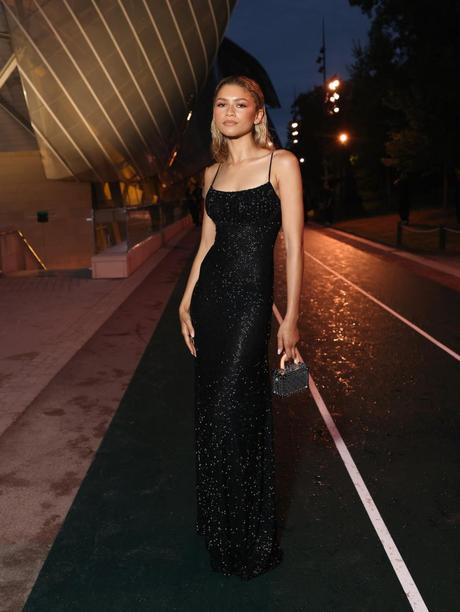Only the fashion industry could make partying while Rome burns (take your pick of global crises) look so fabulous. The night before the Olympics opening ceremony, Dame Anna Wintour flew to Paris to host what felt like an expanded version of Vogue World's event in June.
Just over a month ago, Wintour led Conde Nast's show of imperial might, which saw pop stars Sabrina Carpenter and Bad Bunny join Serena Williams and Kendall Jenner in walking across the Place Vendôme to "celebrate 100 years of fashion," with a sporty element for the Olympic appeal - some 88 athletes also took part.

The aim was to cement Vogue's ownership of the industry and position it as a brand extension that extends well beyond its traditional publishing arm. See also the new Disney+ series, In Vogue: The 90s, airing in September, in which Edward Enninful joins Wintour and other exalted Vogue editors to discuss the decade that "changed fashion forever" in their PR pitch.
Telly is busy on his crusade to make fashion happen on his payroll. Witness this year's outburst with AppleTV+'s The New Look , Disney+'s Cristóbal Balenciaga , and the recent Becoming Karl (Lagerfeld) series; while September also sees the release of a new drama series based on a fictional haute couture house, "La Maison" (on AppleTV+).
We're in the latest phase of fashion-tainment, with all of us fervently hoping that the viral interest this world generates can be converted into lucrative content for providers eager to capitalise on our obsession with dwelling on how we look.
Everyone fervently hopes that the viral interest that fashion-tainment generates can be converted into money
That's one thing for publishers and manufacturing companies - what does all this mean for the core business of selling clothes? Not much at the moment. Last week, both LVMH and Kering - the two superconglomerates that between them own the most fashion brands you've ever heard of - posted lackluster financial results. Gucci-owner Kering fared worse than LVMH, which owns Louis Vuitton and Dior, but given Burberry's nosedive, the much-vaunted luxury slowdown is here.
Mike Ashley's Frasers Group has permanently closed Matches, with its landing page now directing customers to Flannels, its existing designer chain (seen as a stack-'em-high offering, rather than the carefully curated pieces Matches used to offer). Browns, once the jewel in London's retail crown, has made further redundancies, shedding its branding and editorial teams, and cutting jobs at its embattled parent company FarFetch.
It's a desperate end to a period in which we've been given endless amounts of stuff; in which brands have unwittingly devalued their stock by producing £500 T-shirts, hoping to create desire based on an illusory knowledge of what that brand might say about our own personalities (or lack thereof).
We've swallowed the nonsense that fashion labels equal social currency. We're so caught up in creating an identity that we're desperately reaching for ephemeral materials. We're up to our ears in the idea that the "right" item can make us important, that we can shop our way to praise, that what we buy makes us interesting.
Fashion loves nothing more than smoke and mirrors marketing spend
Fashion brands have been eager and methodical about this, basing their core business not on exciting ideas but on sneakers and hoodies and interchangeable merchandise that is maliciously marketed. Prices have gone up, the so-called "aspirational" customer has been cynically abandoned when the numbers don't add up and traded them for the offshore bank accounts of the super-rich. Except, poof. Even they've had enough now.
And that's without even mentioning our collective hangover from overconsumption, where we're left unimpressed (or just plain broke) by a new shoe that looks the same as every other shoe costing £800+ (see the currently popular ballet flats/loafers), even though these shoes are being aggressively pushed into our algorithms by countless paid celebrities and influencers.
Yet the fashion world loves nothing more than smokescreens and marketing spend, fueling extravagant productions that poor, beheaded Marie Antoinette could only dream of (incidentally, only the French could turn that cold-blooded murder into a lolz vaudeville).
Despite the bleak retail horizon, Friday night's madcap, unsuccessful opening ceremony has been hailed as "the most fashionable of all time" (let's just ignore the plastic ponchos at Alton Towers). This is in no small part thanks to the reported €150 million LVMH spent on becoming the title sponsor, and why both Lady Gaga and Celine Dion were dressed by Dior, why giant Louis Vuitton trunks were paraded around, and why medals were presented on Vuitton trays. The message: the world's best athletes need the world's best accessories.
The question is, can all this bombardment of handbag brands shift? The industry is adept at whipping up hysteria, and while we may be amused for a while, can spending money to shout the loudest really lure back its wealthy clientele?
Feathers at sunrise
Attentive Instagram readers may have spotted a quickly edited, old-fashioned designer tantrum that harkens back to the glory days of yesteryear when creatives would publicly trash each other (making for more fun and more interesting gossip).
The tea? Anthony Vaccarello, the current creative director of Yves Saint Laurent, took umbrage with Lady Gaga's Dior haute couture Opening Ceremony look. She wore a Zizi Jeanmaire number, Mon Truc en Plumes, adorned with fluffy pink feathers (announced via the fashion house with the caveat that "the feathers used to create this Dior creation were collected during the moult of birds" - surely a relief to us all). Vaccarello's problem was historical, that Jeanmaire, bien sûr, had been a muse of Yves Saint Laurent, and it was his house that had created her original costumes.
Fashion nerds might point out that, unfortunately, Dior-owned LVMH was sponsoring the show, not Kering's YSL, and so the Italian wasn't called upon to help out. Feathers at dawn indeed. Or, in Vaccarello's hastily deleted words, "what a shame, there is no dignity left." Sacré bleu, etc.
